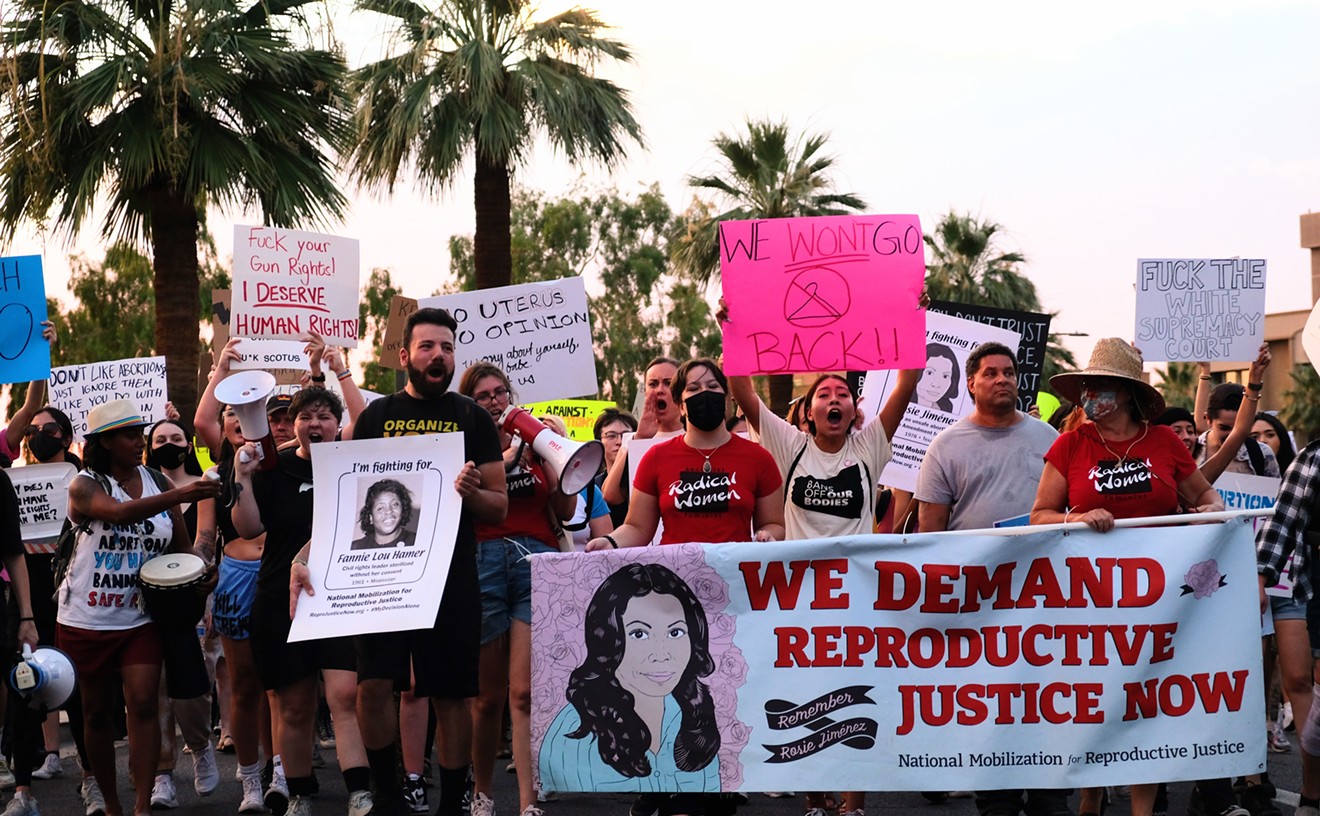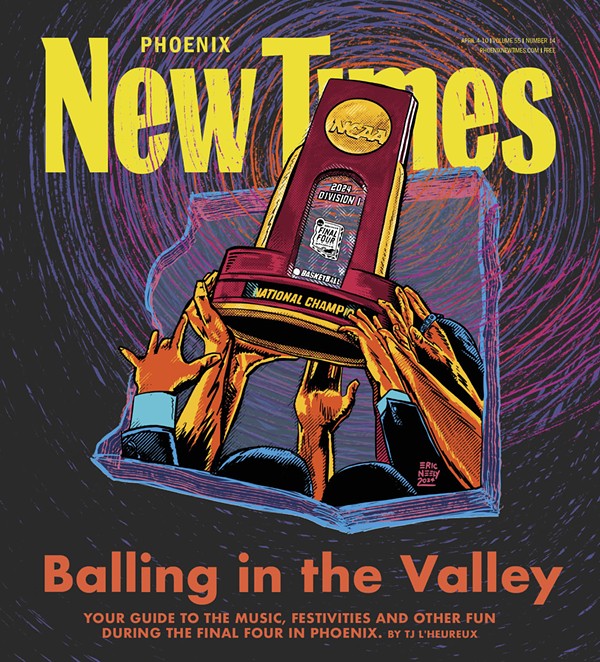Owens didn't forget his glasses so he could read the legal papers about his case at his initial appearance in court later that afternoon. He knows the drill well.
In 1986, a Maricopa County judge sentenced Owens to 20 years in prison for stealing from elderly patients while working as a paramedic. He served less than seven years, then got out of prison in exchange for his work as a government snitch.
Owens soon reinvented himself as a private investigator with deep ties to the street. He courted local criminal-defense attorneys, and worked his way up the ladder until reaching the top rung in the mid-1990s.
That's when storied Phoenix attorney Tom Thinnes took him under his wing.
At the same time, Owens continued to work as an informant. He'd throw tidbits of information to cops and prosecutors in return for his continued insulation from prosecution whenever he ran afoul of the law, which seemed to happen on a regular basis, according to police reports and other documents.
Apparently, no amount of tattling could save him last Wednesday, as he bided his time in a little holding cell.
By prior agreement with prosecutors, Owens had surrendered after a Maricopa County grand jury indicted him on 15 felony counts, including theft, fraud, forgery, burglary and possession of cocaine.
Owens' attorney, Steve Dichter, had conceded in a July 11 letter to prosecutors that many of those alleged crimes -- Owens says he's innocent -- were first documented in two New Times stories ("Catch Him If You Can," August 12, 2004, and "Lord of the Lies," November 11, 2004):
"The New Times became the primary place from which we learned the allegations that, with almost no important exceptions, are the allegations contained in the indictment."
Owens, 42, long had evaded prosecution, and most observers familiar with his history as a criminal-justice system "embed" doubted he'd ever be busted again.
But if Mike Edwards, a special agent for the Arizona Attorney General's Office, and county prosecutor Brad Astrowsky win the day in court, Owens will be spending many more years in prison.
Edwards got on the case in early 2004, after the dramatic collapse of the extremely tight personal and business relationship between Owens and Tom Thinnes. Thinnes provided boxes of evidence to the agent that allegedly implicated Owens in all manner of criminal wrongdoing.
The current charges against Owens include the alleged theft of about $200,000 from 15 victims, many of them clients of Thinnes or attorney Mike Vaughn.
In several instances, Owens is accused of stealing money or property that was supposed to be payment as a retainer for legal services. Turns out that many of the clients and their families believed Owens was an attorney associate of Thinnes.
Thinnes denied until the end that he'd known anything about any wrongdoing by Owens until way late in the game. Many who knew the pair say that Thinnes had to have known, and had continued to look the other way for his own, selfish reasons.
However, others insist Thinnes simply got conned by a master.
Among other charges, the new indictment accuses Owens of stealing $28,000 from a Goodyear widow for whom he'd allegedly been working for free. The woman had allowed Owens to control the distribution of a substantial life-insurance benefit payable to her after her husband's death.
Authorities confirm that the investigation into Owens is continuing, with more charges a distinct possibility. Court records indicate that Agent Edwards is just getting into the details of the alleged theft by Owens last year of about $500,000 from Owens' wife's grandfather's estate.
If one includes that sum and another $400,000 that Edwards also suspects Owens stole from Thinnes, the amount increases to more than $1 million.
Thinnes, who died of a stroke last September, is a central figure in this saga. His intense allegiance to Owens over the growing objections of Thinnes' family and longtime associates ultimately cost him much of his hard-won reputation.
Many people, including his family, are convinced that the stress over the Owens "situation" killed him. (Attorney Vaughn also died suddenly last year, a few months before Thinnes. Vaughn was 56. Thinnes was 64.)
Prosecutors so far haven't asked grand jurors to indict Owens for stealing from Thinnes, and with good reason.
Suppose that Owens did steal truckloads of money from Thinnes. It still would be a tall order for jurors to find sympathy for a sophisticated lawyer who befriended a known con artist for years.
It may prove easier for prosecutors to deal with Thinnes in trial as both an uncharged accomplice of Owens and a patsy than as a classic victim.
County prosecutors asked a court commissioner to order Owens to be held in lieu of $2 million bond. Even that amount would have been doable for Owens, whose known checking accounts alone totaled almost $700,000 in early 2004, according to documents filed last month by the Attorney General's Office. He would have had to put down $200,000 to make bail.
But county prosecutors already had persuaded a Superior Court judge to freeze Owens' substantial assets. That included his known bank accounts, his upper-end condo in a gated Phoenix community, and his four high-dollar vehicles.
The lack of immediate financial firepower left Owens unable to make bail as he awaited his initial appearance at 5 p.m. last Wednesday. For a guy who's beaten more bona fide beefs than Tony Soprano, his impending incarceration at Sheriff Joe's hotel was quite the turn of events.
Owens had spent the previous weeks of this ugly Phoenix summer at his lovely, gated summer home outside San Diego. With him were his wife, Terri, and their two young children.
Besides the summer home, Owens and his family maintain the upscale address at Central Avenue and East Missouri. It's been on sale for a while, with an asking price of $730,000.
Owens also has a relationship with a girlfriend and their young daughter, who live in a nearby apartment (she had the child well after Owens married Terri, an ex-corrections officer whom he met and wooed during an earlier stretch in prison).
Before his summer hiatus, Owens often spent his evenings at the Phoenix City Grille, located at 16th Street and Bethany Home Road. The bistro's part-owner is Larry Debus, yet another prominent local attorney with close ties to Owens.
From the restaurant to the 4th Avenue Jail is only about five miles, but it might as well be a million. And here was Bob Owens, paunchy and pasty-faced, the unwanted focus of attention in Commissioner Kathleen Mead's brightly lighted jail courtroom.
Owens sat in the front row with his attorneys, Dichter and Jennifer Healey, and calmly perused the indictment against him for the first time. Those in court on other business would have been hard-pressed to tell which one was the client.
Standing a few feet away, prosecutor Astrowsky and case agent Edwards awaited Dichter's argument for a reduction of bail.
Dichter started by telling the commissioner that the New Times stories "essentially laid out most of the charges that are listed in [the indictment], so this comes as no shock. . . . [But] the fact of the matter is we anticipate putting forward a very vigorous defense of these charges and are decidedly not guilty."
When it was his turn, Astrowsky pointed out that Owens has been on the wrong side of the law since the 1980s, and that the new charges are extensive and serious. The prosecutor said that Owens has talked his way out of trouble umpteen times since his early release from prison in 1993, usually by providing "information" about ongoing cases to authorities.
"This time that opportunity is not going to be provided to Mr. Owens," Astrowsky told the commissioner, as Owens stared straight ahead, expressionless.
The prosecutor, whose reputation around the courthouse is excellent, sounded as if he meant what he'd said.
Commissioner Mead kept the bond at $2 million.
A sheriff's deputy led Owens off to a jail cell. He's staying in a maximum-security cell, at least until a Superior Court judge considers Steve Dichter's "emergency" request for a bond reduction in a few weeks.
The case of the State of Arizona vs. Robert Owens promises to be a classic, with major-league players and criminal allegations.
Dichter made clear in court documents filed last Friday and in an 18-page letter he sent to prosecutors on July 11 how he plans to defend Owens.
To summarize: The dead guy made him do it.
Dichter will argue that Tom Thinnes ripped off his own clients, the IRS, and Bob Owens, then tried to put the blame on Owens, who was an easy target. He'll claim that Owens was duped by both the late Thinnes and Vaughn.
Thinnes predicted this strategy in an interview with New Times in July 2004, saying that Owens would be claiming "that I put him up to this crap. But I didn't. He's a criminal all on his own."
But even the savvy Thinnes probably couldn't have foreseen the lengths that Dichter plans to go to smear his memory in an attempt to walk his client.
"Thinnes hated pretty much everyone, but that was just his general outlook," Dichter wrote to prosecutor Astrowsky in his recent letter. "When he thought he had been screwed, his vengeance knew no bounds and the truth meant absolutely zero to him. . . . Owens was his last victim, though he couldn't have known it at the time. But, now, having been exposed before his death as a perjurer, Tom can only continue to work to exact his vengeance through you. I hope you don't fall for it."
Though Bob Owens has listed various birthdates in court documents, he probably was born in Tucson on March 1, 1963. His father was Dr. Sherwood Owens, a prominent dentist, and Owens was raised in an upper-middle-class household as one of five siblings.
Owens has claimed in writing over the years that he graduated from the University of Arizona, but he never attended the institution. He moved to Phoenix in early 1982, and went to work as a paramedic for two area companies.
But his yen for crime -- family members later recalled he'd been stealing from them for years -- soon took center stage in his life. In March 1986, sheriff's deputies arrested Owens at the Sun City fire station. A search of his duffel bag revealed credit cards belonging to many people, including elderly residents whose cards had vanished while paramedics responded to their homes.
Police later tied Owens to at least 15 cases with 161 pieces of stolen property. He ultimately blamed his crime spree on cocaine addiction.
As in later years, Owens tried to talk his way out of a prison sentence by promising to tell all about more serious crimes -- major drug smuggling and murder -- that allegedly had been committed by other paramedics and his bosses.
But Owens' supposedly hot information never passed muster. Then, as he awaited sentencing, Owens defrauded a loan company of thousands of dollars.
A probation officer wrote of him at the time, "[He] is the picture of a young and upwardly mobile junior executive, both respectful and successful. Digging deeper, it does not take long to see it is merely a carefully constructed façade of success and respectability -- there is no substance there. Mr. Owens has demonstrated an ability to manipulate situations and individuals for his benefit and personal gain, with no thought for those he has victimized."
In December 1986, Maricopa County judge E.G. Noyes Jr. sentenced Owens to 20 years in prison, the maximum.
Before sentencing Owens, Judge Noyes told him, "I am convinced beyond a reasonable doubt that I can't believe you, that you can't be trusted, and will steal from everybody that you contact with and will lie to anybody that you do come into contact with."
The judge was prescient.
But Bob Owens served less than seven years before convincing authorities that he had more to offer as a police snitch outside prison walls than as an inmate. Noyes, by the way, wasn't consulted before another judge agreed to cut Owens loose.
Records obtained by New Times indicate that Owens provided leads to various local police agencies, usually about druggies and deals allegedly about to happen. It isn't certain how valuable his information was, though he continued to work behind the scenes with cops until just a few years ago.
According to the recent affidavit for a search warrant of Owens' home, Owens has worked as an informant for the Tempe and Glendale police departments, the Attorney General's Office, and possibly the FBI.
At the same time he was making his bones as a street snitch, Owens began to find work with local criminal-defense lawyers as a budding private investigator.
In the mid-1990s, he hooked up with Thinnes, one of the Valley's top criminal-defense attorneys for more than three decades. The pair became fast friends and business partners, and Owens bought into half of Thinnes' downtown Phoenix law office building in 1999.
Getting freed from prison prematurely did not equate with going straight.
The evidence suggests that Bob Owens has lived for the next con since he was a youngster in Tucson. His early release seemed to empower him, and solidified his reputation in legal and law enforcement communities as an untouchable.
His fortuitous connection with the powerful Thinnes only accelerated his rise.
Bob Owens' own uncle, a clinical psychologist, testified in 1986 that Owens is a "classic sociopath."
If authorities are accurate about the case of Goodyear widow Elizabeth Pfeifer -- which only recently came to light -- that description only partially covers it. The grand jury indictment against Owens lists Pfeifer as an alleged victim of theft and fraud, major felonies that both carry long prison sentences upon conviction.
Agent Edwards recently described in a court document how he discovered a November 2001 life-insurance check stub to Pfeifer while going through Owens' records after an earlier search in May 2004.
That check was for $253,028.
Edwards also saw another check from Pfeifer to Owens for $2,000, dated one week after the big insurance check was issued.
The agent tracked down Pfeifer, and heard her story: She said her husband had died in January 2001 at the age of 44, and her priest had recommended Tom Thinnes as an excellent choice to help sort out her legal and financial affairs.
Pfeifer told Edwards she'd spoken to Thinnes just once, on the phone, and he'd referred her to Bob Owens. Owens had come out to her home, and promised to help her for free because he attended the same church as she did.
Pfeifer said she'd assumed Owens was an attorney who worked with Thinnes, and still believed that to be so when Edwards visited her years after the fact. She said Owens had arranged to have the insurance check sent to him "to lower taxes" -- whatever that meant.
Owens soon started to dole out the insurance proceeds to Pfeifer in a series of cashier's checks. Pfeifer said she'd believed Owens eventually had given her the entire amount, which she said was exactly $225,000.
Agent Edwards then showed her a copy of the insurance check for $253,028. She said she'd never seen that check before, and hadn't endorsed it, though it had her name and signature on it.
Pfeifer said Owens had provided her with one cashier's check for $187,000, which she'd immediately transferred toward the purchase of a new home. She said she'd been so pleased with Owens' charitable help that she'd written him a check for $2,000.
Edwards also examined some of Owens' journals and saw a handwritten entry, "December 1. Pfeifer, Liz. $28,028."
According to Agent Edwards, "She did not know that Robert Owens kept $28,028 for himself."
Owens now faces charges of defrauding and stealing from the widow -- two out of the 15 counts in the indictment.
Steve Dichter put a different spin on the Pfeifer affair in his July 11 letter to prosecutors. He claimed that Tom Thinnes did "months of work" for Pfeifer after the insurance company first had balked at paying the benefit.
"Tom didn't work for free," Dichter wrote. "Pfeifer was not his kin. Whether Tom told her he was going to charge for the work he did or not, the facts are that when the check came in, Tom directed that Bob put it in the [firm's] Disbursement Account. Certainly, Tom told Bob that he was supposed to get paid."
In paperwork filed last Friday for a reduction of Owens' bail, Dichter said IRS officials likely will dub the so-called disbursement account the "Thomas A. Thinnes Tax Evasion Account."
"This is the account which Thinnes had Owens deposit many of the fees and retainers he received," Dichter wrote. "From that account, disbursements were made by Owens at Thinnes' instructions. Some payments paid for Thinnes' wife's credit card, some his children's educational and ordinary living expenses, some went into remodeling his Oregon summer home . . ."
Dichter neglected to point out that Owens had sole access to that disbursement account.
"In this case, Thinnes decided to keep $25,000 from the insurance proceeds and split it with Owens," Dichter argued in his motion. "The ledger shows Owens and Thinnes split the $25,000, $12,500 each, on December 2, 2002. The remaining $3,028 . . . paid for some expense."
Elizabeth Pfeifer could not be reached for comment for this story.
On the subject of alleged tax evasion, another point needs to be made: During his May 2004 search, Agent Edwards also located copies of joint tax returns filed by Bob and Terri Owens, and those accounting ledgers in Owens' handwriting.
The ledgers allegedly show the couple's true total gross income from 1997 through 2003. In 2000, for example, Owens' ledger says the couple grossed $426,409, but reported just $18,431 in income between them.
The following year -- shortly before they bought the condo at 77 East Missouri for $400,000 -- the Owenses reported $46,582 in income to the IRS.
Bob Owens' ledger said he'd grossed $500,926.
From 1997 through 2003, Owens' own ledger added up to $2.3 million in gross income. Not bad for a felon just four years out of the joint with a stay-at-home wife.
Steve Dichter is obviously taking great delight in attacking Tom Thinnes to try to save Bob Owens from a life behind bars.
"I knew [Thinnes] for 30 years as a prosecutor and defense lawyer," he wrote in his July 11 letter to Brad Astrowsky, "and . . . there was never a moment that I believed a word he ever said."
Thinnes was no slouch -- even Dichter admits that. Nor is Dichter, a former white-collar prosecutor for the U.S. Attorney's Office and current member of the governing board of the State Bar of Arizona.
The two feisty lawyers last confronted each other during a contentious hearing at the Old Courthouse last September 1.
The civil case at hand was Thinnes vs. Owens, in which a judge was asked to resolve disputes between the men over the potential sale of the law-office building that the two men then owned. (The building finally was sold last month for $600,000 -- half to Owens, half to the Thinnes Estate.)
Thinnes got so steamed during Dichter's cross-examination of him that he twice challenged his adversary from the witness stand to take their differences "outside."
To be kind, it was not Thinnes' brightest courtroom moment.
Two weeks later, he died.
The judge later held Bob Owens in contempt of court, concluding that "substantial evidence at the hearing demonstrated that [Owens] has engaged in a pattern of removing and/or destroying or tampering with [Thinnes'] office records in an apparent effort to harass [Thinnes] and interfere with his legal practice."
As the county's grand jury investigation moved forward, Dichter asked prosecutors months ago to allow Owens to testify. He withdrew the request two weeks ago.
"With Thinnes having been the main source of underlying information to [Agent] Edwards," Dichter wrote in his July 11 letter, "it was formerly viewed as essential that Owens directly rebut Thinnes' accusations. Now, however, with homage to Gore Vidal's reaction to the death of Truman Capote hanging in the air (when asked for reaction, Vidal termed Capote's death 'a good career move'), the need for any sort of a rebuttal of that type has passed, along with anything Thinnes may have had to say."
Dichter also implied in his letter that Thinnes and New Times somehow had conspired to get Bob Owens.
"You and your agent [Edwards] have been sold a major bill of goods by both the dead and the living," Dichter wrote, adding that an "ancient Chinese aphorism holds that the faintest of ink is more powerful than the strongest of recollections . . ."
One problem for Owens is that the ink used to describe his wrongdoings is indelibly etched into the public record.
Certainly, not everyone subscribes to Steve Dichter's position that, in his words, Tom Thinnes was a "craven and dishonest" man.
One of Thinnes' sons, Ben, tells New Times, "As for the suggestion that Mr. Owens may attempt to place some of the blame for his actions on my father, all I can say is that this is a sad statement. . . . My father was an honorable man and a respected member of this community, and it is disappointing to hear that someone like Mr. Owens would drag my father's name into his own problems."
Ben Thinnes, who is an attorney for a large Phoenix firm, adds that "we take comfort knowing of Mr. Owens' arrest and commend the authorities for taking the action they have. All of us, the entire Thinnes family, are still struggling with the unfortunate passing of my father last year and we would simply like to move on with our lives."
Unfortunately for Tom Thinnes' survivors, however, their loved one's enduring legacy for many will be his difficult final years, when he became so entangled with Bob Owens.
Longtime family friend Derek Van Arman touches on that when he says, "Tom Thinnes will always be one of my heroes because he was so damned decent. That's what made him vulnerable. His weakness is that he believed in rehabilitation -- and forgiveness -- so he gave everyone a second chance. By the time he realized what was happening [with Owens], he was trapped in a 'creature feature' with human garbage."
An author and onetime government security analyst who lives in Scottsdale, Van Arman says Owens' criminal defense is inevitable. "Watch as he tries to change his skin to become the victim," he says, "proof he's clever as any other witness reptile. When the last chapter's written, it will be clear that Owens only had one gift -- the gift of the sociopath."
Steve Dichter's got a client to represent, and a difficult one at that.
In concluding his July 11 tome to prosecutors, Dichter implored them to "take another look at all this. Your 'best' witnesses [Thinnes and Vaughn] are dead and, frankly, they had absolutely no credibility in any event. Your next set of witnesses are a bunch of drug dealers if, frankly, you even have them.
"The forensic work by [Agent] Edwards, to date, has been completely inadequate, but that is only because Thinnes had Edwards so hot-boxed about Owens that he decided to proceed without getting his proof aligned."
Sounds like Mike Edwards is the Barney Fife of Arizona law enforcement, and that Tom Thinnes was the prototype for Al Pacino's evil character in The Devil's Advocate.
So what does that make Bob Owens?
Now that will be up to a jury to decide.










